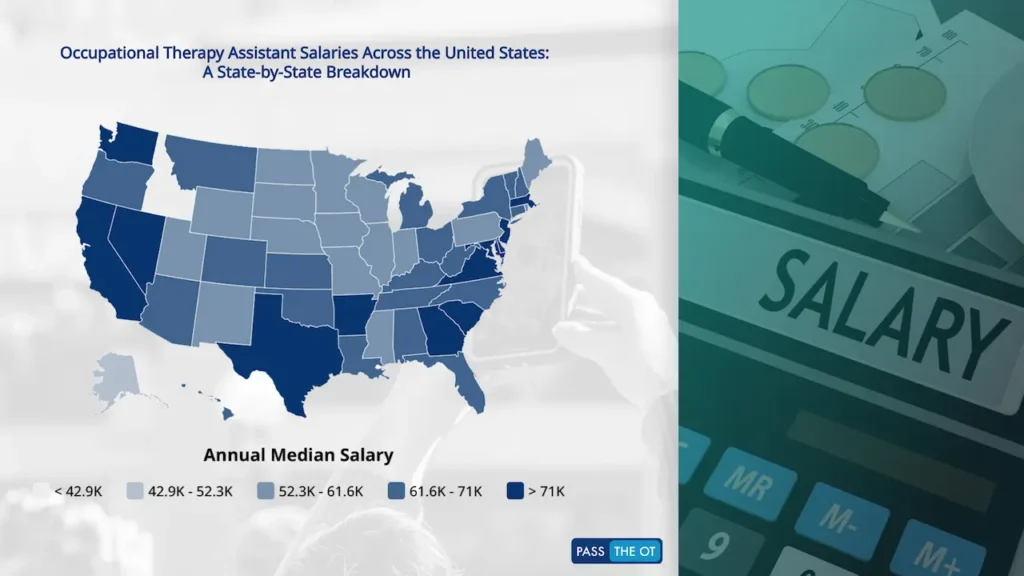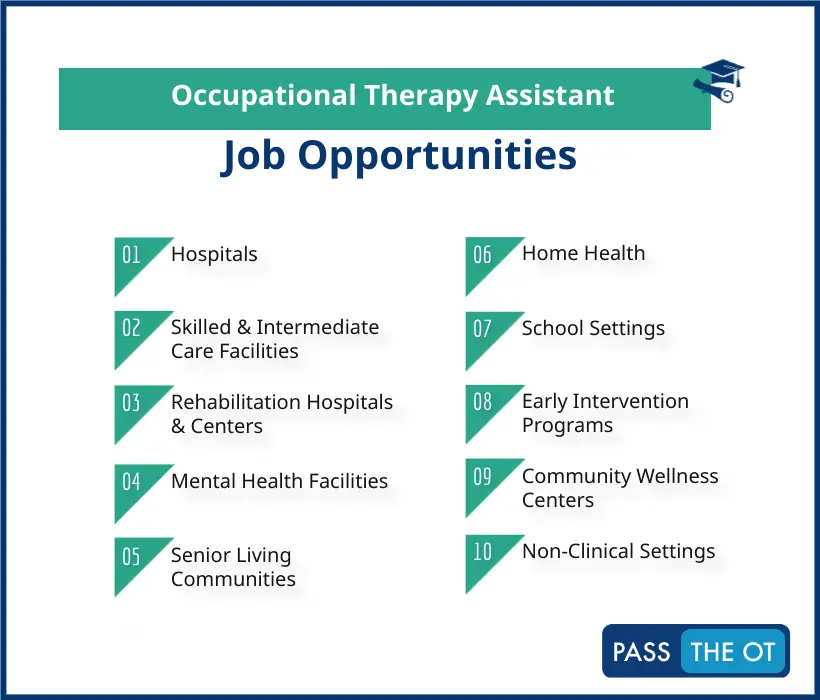OCCUPATIONAL THERAPY ASSISTANTS’ EARNING POTENTIAL
REWARDING WORK GUARANTEED TO MAKE A POSITIVE IMPACT
Occupational therapy is a tough but extremely rewarding profession. It is considered one of the most fulfilling and flexible careers in healthcare, with most occupational therapy practitioners choosing this profession due to a passion for helping people lead healthier, more productive lives.
This profession is regarded as one of the few healthcare disciplines that doesn’t require providers to be on call, work nights and weekends, or take double shifts. Coupled with its focus on improving quality of life and the versatility of work roles across many practice settings, occupational therapy assistant is a coveted job title in the medical field.
Occupational therapy is a growing healthcare field in the United States, with employment opportunities expected to increase steadily. The United States Bureau of Labor Statistics (BLS) has consistently placed certified occupational therapy assistants (COTA®) on their list of the fastest-growing occupations.
In 2023, the BLS predicted much faster than average job growth (21%) for COTAs® over the next decade. As there is already a shortage of COTAs® in the USA, you will always have work, and it’s doubtful that you will be replaced by artificial intelligence (AI) or other automated technologies.
After all, you are part of a client-centered profession, where OT interventions are designed around each individual’s specific needs, goals, and preferred occupations.
SALARIES
COTAs® may not earn as much as some other professionals, but this profession offers a stable income. It does not require lengthy academic training, making it desirable for people who have a family to support, cannot afford much schooling, or are embarking on a second career path later in life.
According to the BLS, the median annual wage for occupational therapy assistants was $65,450 as of August 2023. Depending on a therapist’s place of employment and work arrangement (e.g., if they work part-time, full-time, or per diem), some COTAs® may have an hourly job instead of a salaried one. In this case, the average hourly rate for a COTA® as of August 2023 is $31.47 per hour.
As with most work roles, a COTA’s® salary has the potential to increase as providers gain experience. Other factors also determine COTA® salary. One such example is location, since someone who works and resides in a place with a higher cost of living will have a higher salary compared to someone in a city with a lower cost of living.
Company size is also correlated with COTA® salary, as smaller clinics and local hospitals may not be able to offer as high of a salary as larger health systems or multi-practice facilities. High-performing COTAs® may also see slightly higher wages than their counterparts. Depending on the organization, performance may culminate in consistently high productivity rates, good performance reviews, and possibly even patient commendations.
Someone’s skill level is also a deciding factor in how much they earn. A COTA® with 15+ years of experience is likely to make more money than a newly graduated COTA®, especially if the more seasoned clinician has changed places of employment.
In some cases, a higher skill level indicates a provider has an official or unofficial specialty. Unofficial specialties usually involve a demonstrated work history or the completion of continuing education in a specific practice setting, such as orthopedics or pediatrics. Official specialties take the form of added credentials or certifications in a particular practice area of OT beyond the board certification required to practice as a COTA®.
While these factors are not always associated with pay increases, any of the above may increase earning potential for a COTA®. They also raise someone’s chances of assuming other job roles, such as director of rehabilitation or fieldwork supervisor, that may lead to a salary increase.
So, as you can see, there is some variation in COTA® salary, which means it’s difficult to gauge exactly how much someone will make in this field. Overall, though, COTAs® tend to make a good living.
This map highlights the median annual salaries for Occupational Therapy Assistants by state, showcasing the regional opportunities and earning potential in this rewarding healthcare field.

DIVERSE PLACES TO WORK
The United States of America offers exceptional opportunities for occupational therapy practitioners due to the high demand for the expertise of rehabilitation professionals. After becoming certified and licensed, COTAs® can choose what setting and population they prefer their work to focus on.
Work places include:
- Hospitals (short-term inpatient facilities)
- Skilled and intermediate care facilities (subacute care facilities, also known as skilled nursing facilities)
- Rehabilitation Hospitals and Centers (also known as acute rehabilitation hospitals)
- Mental health facilities (inpatient psychiatric hospitals, outpatient clinics, and clubhouse programs)
- Senior Living Communities (assisted living facilities, some of which have joint independent living facilities while others do not)
- Senior day programs (may also be known as adult day care centers)
- Home Health (provided for those who need rehab but cannot seek it elsewhere due to being homebound)
- Early intervention programs (provided within the home for babies between 0 and 3 years)
- School settings (therapeutic day schools, private schools, public schools)
- Community wellness centers
- Outpatient clinics (hand therapy clinics, sensory gyms, orthopedic clinics)
- Non-clinical settings, assuming roles such as educator, fieldwork coordinator, or program chair
COTA® SALARY BY SETTING
Where can COTAs® make the most?
COTAs® generally tend to make more money working in home health care or skilled nursing facilities. Though, as we mentioned, many factors impact COTA® salary. It’s also important to note these settings may offer additional work opportunities, which can sometimes skew salary values. Some home healthcare salaries do not reflect a 40-hour work week, as it’s common for clinicians in these settings to take on more cases. Similarly, large or understaffed skilled nursing facilities may have overtime opportunities on the weekend (that many therapists take advantage of), which can impact a COTA’s® yearly salary.
What about the least?
There isn’t much data about COTA® salaries on the other side of the spectrum, but many therapists know that COTAs® make less when working in mental health settings and adult day cares. Community-based mental health settings and adult day care sometimes operate partly on grant funding and subsidies, which means there may be less money for provider salaries. On a more positive note, these are some of the most rewarding settings for COTAs®, since they lack productivity settings and enable more provider autonomy.
OPPORTUNITIES TO EXPLORE THE USA
If you are interested in seeing the country, travel occupational therapy can be lucrative and rewarding.
States with the Highest Employment level in Occupational Therapy Assistant
| State | Hourly mean wage | Annual mean wage |
| Texas | $ 35.43 | $ 73,690 |
| Florida | $ 32.91 | $ 68,450 |
| Illinois | $ 31.30 | $ 65,090 |
| Ohio | $ 31.33 | $ 65,170 |
| California | $ 38.25 | $ 79,560 |
TESTIMONIALS FROM PATIENTS REGARDING OT’S IMPACT IN THEIR LIVES

The day an occupational therapist changed my life–
5 individuals tell their stories of how their lives were turned around by the help and support from an occupational therapist.
Martin B
“In December 2010 I was rushed to hospital with a brain hemorrhage. I was in there for two weeks and came out on New Year’s Eve. I thought I’d soon be ready to go back to work, but when my OT came to interview me, I fell asleep as she was talking to me. She gave me tools to stop the fatigue setting in. Just a 10 or 15 minutes meditation, even in a noisy room, and I get my energy back and am ready to go again. It was six months before she finally said: ‘You’re fit to go to work now.’ It was a sad day when she said she was totally discharging me, because I was losing that safe place. I didn’t think occupational therapy would help somebody like me. It’s such an eye-opener. I can never thank her enough.”
Mike K
“I was on holiday 16 years ago and I dived into a swimming pool, not realizing it was the shallow end. I hit my head on the bottom and broke my neck. I spent 10 months in a hospital in Glasgow, where I received occupational therapy. It was just learning to do things with the limited mobility I had in my hands – picking things up, fastening buttons, dressing myself, the things you take for granted. Before my accident, sport was my main interest. While I was at the unit, I was able to use the hydrotherapy pool and take part in sports days. When I came out I took up wheelchair rugby and competed in the 2012 Paralympics. If it wasn’t for the OTs, I would never have had the opportunity.”
Esther R
“I had my fall after stepping on the worktop in my kitchen to reach the meter, which is in a high cupboard, and landed on my shoulder, fracturing my humerus. The specialist from the fracture clinic decided it needed to be pinned and have a plate put in. Once back at home, I had an OT from the rehab team come in and see me twice a day for a week, and then in the mornings for a week after that. They helped with the dressing, and I also had to have help with drying my feet and back. It was not only a help in the practical sense but a pleasure to know someone was coming in. We joked and got on. It was invaluable.”
Maria S
“I’ve had a double lung transplant. Last year, I was told about a new choir called Singing 4 Breathing, for people with chronic obstructive pulmonary disease (COPD), run by OT students at Northampton University, so I went along to find out what it was all about. There are 50 of us, we meet weekly and sing a mix of folk and pop songs. The teacher has taught us how to breathe when singing. It makes you feel so happy and joyful. I never knew I could sing a tune. It’s so amazing when you think you can’t speak because you have COPD, and yet you can sing.”
Joe L, and his son Tom
“Our son Tom suffered a huge brain injury when he was born. About 40% of the left side of his brain had been damaged. We were told he would find certain things very challenging, especially speech, high-capacity functions and movement. We met Anne Gordon, who manages the OT team at Evelina London children’s hospital, when Tom was six months old. Tom would never grab anything with his right hand, so Anne suggested using constraint-induced movement therapy, which meant restricting his left hand, forcing him to use his right hand. Tom’s right hand is still affected, but he can now grab a ball with both hands, and hold a cup – things that other people would think is not that big a deal, but for us it’s absolutely massive.”
Source: The Guardian
BE INSPIRED
Meet Lupita Rodriguez who overcame setbacks to become an Occupational Therapist Assistant
Lupita’s story as published online:
For Lupita Rodriguez, the journey to becoming a certified occupational therapy assistant (COTA®) was far from straightforward. Her story is one of perseverance, setbacks, and eventual success. Rodriguez’s college career began while still in high school when she joined the Achieving a College Education program at Estrella Mountain Community College. After graduation, she was accepted into a bilingual nursing fellowship program, but unfortunately failed her course during Block 1 and was placed on a waiting list. It was during this period of waiting that Rodriguez began to search for her true calling.
“When I was placed on the waitlist, I chose not to continue my nursing journey,” said Rodriguez. ”I prayed and kept positive about finding where I was supposed to be. One morning I woke up thinking about occupational therapy. I researched GateWay’s program and applied within a week.” She was drawn to the program because it offered a long-term career that allowed her to help others, a desire that had initially motivated her. “I saw that I could help people reach their highest potential. I began to work in a school with children with special needs,” said Rodriguez. “When they reached a goal, it warmed my heart! I love seeing progress and aiding the progress.”
Rodriguez had to balance many responsibilities and challenges as a wife and mother. She struggled with anxiety and depression, but with the support of her family, she persevered through difficult times. “Some days were not easy. Without my family, I could not have done this. We have all sacrificed so much to get me to this point. I am forever appreciative,” shared Rodriguez.
Rodriguez shares this advice for students still making their way through the program: “Enjoy the ride, enjoy the process, and have fun! Yes, it can be stressful and hard, but it’s not forever. Smile, be patient, and be ready to learn to change people’s lives.” Looking to the future, Rodriguez is excited to begin her career as a Certified Occupational Therapy Assistant (COTA®). She is confident that occupational therapy is the right career for her and is excited to see where it takes her. She plans to return to school in the future to get her bachelor’s degree in rehabilitation. In addition, she plans to have more children, grow as a wife and mother, and hopefully one day own her own business.
Despite facing setbacks, Rodriguez never gave up on her dreams and continued to work hard to achieve her goals. Her journey serves as an inspiration to others who may be struggling with their own career path.
Ready to Get Started?
If you’re ready to crush your NBCOT® exam, we invite you to contact Pass the OT today for more information.
Will choosing OTA as a career give me job security?
Yes- According to the US Bureau of Labor Statistics (https://www.bls.gov/), overall employment of occupational therapy assistants is projected to grow 21 percent from 2023 to 2033, much faster than the average for all occupations. About 7,800 openings for occupational therapy assistants are projected each year, on average, over the decade.
What is my earning potential as an OTA?
According to the US Bureau of Labor Statistics (https://www.bls.gov/), the median annual wage for occupational therapy assistants was $67,010 in May 2023.
How can I earn more money as an OTA?
Pick a high-paying setting.
According to www.myotspot.com the top paying jobs are currently as follows:
- Home Health OTA.
- Hospital-based OTA (Acute care or Inpatient rehab)
- Academia.
- Skilled Nursing Facilities.
- Non-traditional OTA Roles.
What is unique about the field of OT?
Holistic Approach
What is unique to OT and what sets it apart from other healthcare professions, is its holistic approach to patient care. OT practitioners focus not only on patients’ physical health but also on their mental, emotional, and social well-being.
Treat patients across the lifespan
As the American Occupational Therapy Association (AOTA) outlines, occupational therapy is the only profession that has the privilege to help people across the lifespan. OTPs can treat a diverse patient population and easily transition into a new setting should they seek a career change.









